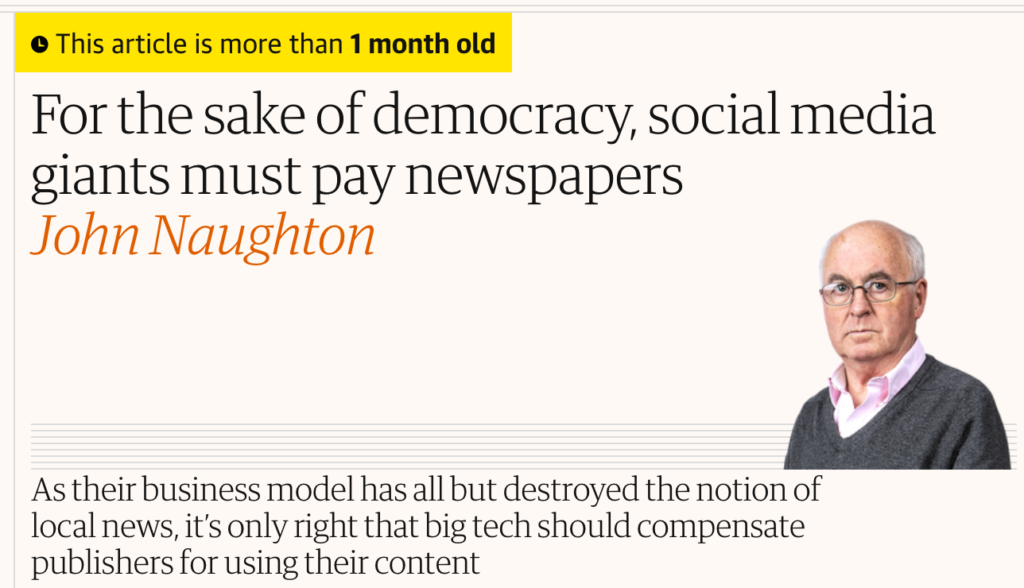As you may have gathered, it’s been snowing round here.
Avoiding “the sociology of the last five minutes” is difficult, sometimes
This yellow warning over my Observer column dated November 28, 2020 is factually correct but epistemologically nonsensical. One of the things I’ve always tried to do in the column is to escape from what the Berkeley sociologist Michael Mann once called “the sociology of the last five minutes” — something that, IMO, bedevils too much tech coverage. This particular column was trying to do just that in the context of the disputes currently going on between tech giants and the governments of Australia and France. Its argument was that the Silicon Valley ideology — that tech drives history and society’s role is simply to mop up afterwards — is pernicious, anti-democratic nonsense. Facebook and Google have profited mightily by hoovering up the advertising revenue that supported local as well as national journalism — journalism that’s critically important for a functioning liberal democracy. So it’s perfectly reasonable for democracies to require these companies to provide restitution for the damage they’re doing.
So here was a column that was trying to provide some historical and constitutional context for a contemporary controversy. The fact that it was a month — or even a year — old happens to be irrelevant in this particular case.
I know that the Guardian means well, and that in many cases it’s helpful to point out that particular online items are hoary old misconceptions. But you can’t do that intelligently simply by algorithmic inspection of calendar dates.
Quote of the Day
”An aristocracy in a republic is like a chicken whose head has been cut off: it may run about in a lively way, but in fact it is dead.”
- Nancy Mitford, Noblesse Oblige, 1956.
Musical alternative to the morning’s radio news
Glenn Gould | Bach – Goldberg Variations| Aria
Biden and the Tech Giants
From the Bloomberg ‘Fully Charged’ newsletter:
Nothing like a blockbuster quarter to draw unwanted attention from lawmakers and regulators. Over the next week or so, Amazon.com Inc. and Apple Inc. are each expected to report record-breaking quarterly revenue of $100 billion or more. Holiday advertising and lockdown-enhanced online engagement are also likely to drive big earnings for Facebook Inc. and Alphabet Inc., whose stock prices have soared since the pandemic’s March nadir.
Normally, the holiday quarter is a moment for celebration, but this is no time to spike the football. Success for the tech industry now serves as a stark reminder of its dominance. While brick-and-mortar retailers and restaurants go under, Amazon, Apple, Facebook and Google have collectively delivered a stunning $67 billion in net profit over the past two quarters.
The companies will be wary of antagonising Biden, largely because nobody has any idea yet of what — if anything — he’s likely to do. On the campaign trail, as Bloomberg points out, he was vague about his plans for big tech.
He has generally derided the industry’s “overwhelming arrogance,” criticized the recklessness and abuses of social-media platforms and said he supports a repeal of Section 230, the legal shield that protects internet companies from liability for user-generated content published on their services. At the same time, many members of his administration have close ties to the biggest players in tech, and questions remain about how far he’ll go on antitrust enforcement.
On the other hand, there’s was a Reuters report that the new President is considering appointing an “antitrust Czar”. And there’s nervousness in the industry about speculation that Biden might make Lina Kahn — one of the brains behind the House Subcommittee fiercely critical report on tech monopolies — an FTC commissioner.
Everything depends, I’d guess, on where controlling tech giants ranks in the new Administration’s priorities. Given all the other stuff on its plate, my (pessimistic) guess is: not high. On the other hand, if Biden makes Ms Kahn a Commissioner then I’ll happily eat my hat.
Long Read of the Day
Why the iPhone is today’s Kodak Brownie Camera
If you’re a photographer, then you’ll enjoy this reflective essay by Om Malik.
Photography as we know it has been around for about 150 years, though its origins can be traced to earlier civilizations. But it has never been so visceral, and so much a part of our daily lives, as it is now. In short, the arc of photography’s history is that it has always been about getting more and more people to take photographs. Our desire to know more about ourselves means we must have more of them, more often, in more places, and of many more things. Whether it was new chemicals or new film or new sensors, technological advances in this area have — by and large — been about making it simpler for us to capture the moment. All of it has brought us to today, when we have quietly passed the cultural tipping point where taking a photo is as second nature as breathing. There’s no art to it. It is just something we are always doing.
Lovely stuff.
Bets, bonds and kids
One of the things I’m grateful for during this pandemic is that our children are all grown up. I know that many of my colleagues who have young children are having a really toughh time trying to combine childcare with remote working. So I was very struck by this blog post by Jeff Kaufman. Here’s the gist:
A few weeks ago Anna (4y) wanted to play with some packing material. It looked very messy to me, I didn’t expect she would clean it up, and I didn’t want to fight with her about cleaning it up. I considered saying no, but after thinking about how things like this are handled in the real world I had an idea. If you want to do a hazardous activity, and we think you might go bankrupt and not clean up, we make you post a bond. This money is held in escrow to fund the cleanup if you disappear. I explained how this worked, and she went and got a dollar:
Then: When she was done playing, she cleaned it up without complaint and got her dollar back. If she hadn’t cleaned it up, I would have, and kept the dollar.
Some situations are more complicated, and call for bets. I wanted to go to a park, but Lily (6y) didn’t want to go to that park because the last time we had been there there’d been lots of bees. I remembered that had been a summer with unusually many bees, and it no longer being that summer or, in fact, summer at all, I was not worried. Since I was so confident, I offered my $1 to her $0.10 that we would not run into bees at the park. This seemed fair to her, and when there were no bees she was happy to pay up.
Over time, they’ve learned that my being willing to bet, especially at large odds, is pretty informative, and often all I need to do is offer. Lily was having a rough morning, crying by herself about a project not working out. I suggested some things that might be fun to do together, and she rejected them angrily. I told her that often when people are feeling that way, going outside can help a lot, and when she didn’t seem to believe me I offered to bet. Once she heard the 10:1 odds I was offering her I think she just started expecting that I was right, and she decided we should go ride bikes. (She didn’t actually cheer up when we got outside: she cheered up as soon as she made this decision.)
I wish I’d been that inventive when mine were the same age.
Other, hopefully interesting, links
- Marques Brownlee on how he built (and is now expanding) his YouTube channel. Interesting throughout, even if you’ve no interest in running a YouTube channel. It isn’t as easy as the good ones make it look. Link
- Photopea: a really powerful, free, photo editor that runs in your browser. Link
- Watch Arnold Schwarzenegger getting his Covid-19 vaccine jab. Link
This blog is also available as a daily email. If you think this might suit you better, why not subscribe? One email a day, delivered to your inbox at 7am UK time. It’s free, and there’s a one-click unsubscribe if you decide that your inbox is full enough already!


